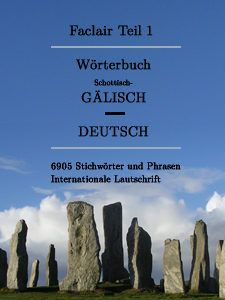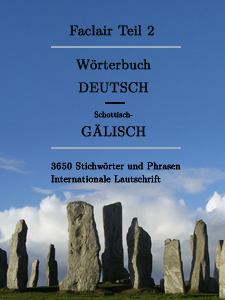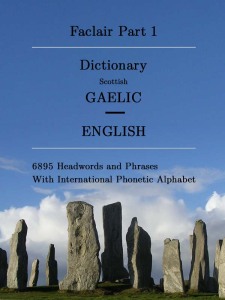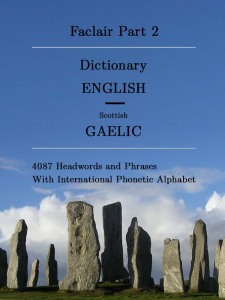Frisch veröffentlicht: Schottisch-Gälische Wörterbücher für Amazon Kindle!
Als Deutscher hat man es nicht leicht, Schottisch-Gälisch zu lernen, wenn man sich nicht auf englischsprachige Lehrmaterialien stützen möchte. In den letzten Jahren hat sich vieles getan; es gibt seit langem Kurse in Deutschland, und auch ein Wörterbuch ist erschienen. Was es bisher nicht gab, ist ein Wörterbuch, das auch die Aussprache in Lautschrift enthält.
Diese Lücke ist jetzt geschlossen mit den beiden Wörterbüchern der „Faclair”-Reihe. Mit einem Umfang von fast 7000 Stichwörtern und Phrasen im Gälisch/Deutschen Teil und mehr als 3500 Wörtern und Phrasen im Deutsch/Gälischen Teil (jeweils ca. 3000 Stichwörter) bieten sie einen grundlegenden Wortschatz, in dem zwar nicht jedes Wort enthalten ist, aber genügend für Anfänger der Sprache.
Zu vielen Stichwörtern werden die häufigsten Wendungen genannt, so daß deutlich wird, wie das Wort im Zusammenhang gebraucht wird. Natürlich werden bei schottisch-gälischen Substantiven auch Plural- und Genitivformen, bei Verben auch die Verbalnomen, bei Adjektiven die unregelmäßigen Steigerungsformen und bei Pronomen die Formen aller Personen (soweit vorhanden) genannt.
Erstmals steht bei jedem Stichwort die Aussprache im Internationalen Phonetischen Alphabet (IPA), das der Standard bei vielen Wörterbüchern ist, und zwar in beiden Teilen, so sie daß auch für Gälisch-Muttersprachler, die Deutsch lernen, nützlich sind.
Und noch ein Merkmal macht die neuen Wörterbücher einzigartig: Es sind E-Books, die sich auf dem Amazon Kindle, PC, Mac, iPhone, iPad und Android-Smartphones lesen und vor allem schnell durchsuchen lassen – kein langes Blättern bis zum gesuchten Wort mehr! Für alle Plattformen bietet Amazon hierfür Leseprogramme an.
Da auf digitale Kopiersperren (DRM) verzichtet wurde, können die Wörterbücher auf beliebig vielen Geräten gleichzeitig benutzt werden.
Auch für ältere PDAs (z.B. Palm oder Sony Clié, für die es Mobipocket Reader-Programme gibt, kann eine spezielle Mobipocket-Version erworben werden (bzw. kostenlos zusätzlich zur Kindle-Version). Anfragen nimmt der Autor gerne entgegen (E-Mail über den Link zu „About”).
Wer erstmal in die Wörterbücher hineinschnuppern möchte, kann sich über die Kindles bzw. kostenlosen Lese-Programme gratis eine Leseprobe herunterladen.
Bisher veröffentlich sind die folgenden Wörterbücher:
Faclair Teil 1: Wörterbuch Schottisch-Gälisch / Deutsch

Deutschland: http://www.amazon.de/dp/B007HAEL6K
USA: http://www.amazon.com/dp/B007HAEL6K
United Kingdom: http://www.amazon.co.uk/dp/B007HAEL6K
France: http://www.amazon.fr/dp/B007HAEL6K
Espana: http://www.amazon.es/dp/B007HAEL6K
Italia: http://www.amazon.it/dp/B007HAEL6K
- Grund-Wörterbuch Schottisch-Gälisch / Deutsch
- 6905 Stichwörter und Phrasen
- Mit Aussprachehilfe in der Lautschrift des Internationalen Phonetischen Alphabets (IPA)
- Enthält eine Kurz-Einführung in die Schottisch-Gälische Sprache und Hinweise zu weiterführender Literatur
- Anmerkung: dieses Wörterbuch enthält nur die Richtung Gälisch-Deutsch. Für die Gegenrichtung Deutsch-Gälisch kaufen Sie bitte den zweiten Teil „Wörterbuch Deutsch / Schottisch-Gälisch”
Preis €3,99 (£3.99)
Faclair Teil 2: Wörterbuch Deutsch / Schottisch-Gälisch

Deutschland: http://www.amazon.de/dp/B007HO3GA8
USA: http://www.amazon.com/dp/B007HO3GA8
United Kingdom: http://www.amazon.co.uk/dp/B007HO3GA8
France: http://www.amazon.fr/dp/B007HO3GA8
Espana: http://www.amazon.es/dp/B007HO3GA8
Italia: http://www.amazon.it/dp/B007HO3GA8
- Grund-Wörterbuch Deutsch / Schottisch-Gälisch
- 3650 Stichwörter und Phrasen
- Mit Aussprachehilfe in der Lautschrift des Internationalen Phonetischen Alphabets (IPA) für die deutschen Stichwörter
- Enthält eine Kurz-Einführung in die Schottisch-Gälische Sprache und Hinweise zu weiterführender Literatur
- Anmerkung: dieses Wörterbuch enthält nur die Richtung Deutsch-Gälisch. Für die Gegenrichtung Gälisch-Deutsch kaufen Sie bitte den ersten Teil „Wörterbuch Schottisch-Gälisch / Deutsch”
Preis €3,99 (£3.99)
In Kürze erhältlich sein werden die folgenden Wörterbücher:
Faclair Part 1: Dictionary Scottish Gaelic / English
Faclair Part 2: Dictionary English / Scottish Gaelic
Ebenfalls in Vorbereitung ist eine Kurzgrammatik der Schottisch-Gälischen Sprache zum schnellen Nachschlagen, als Kindle-Version auf Deutsch.




